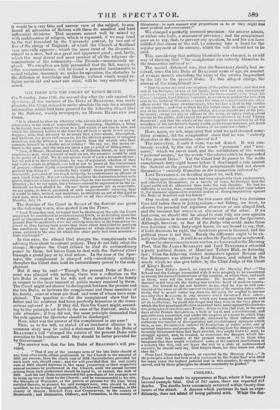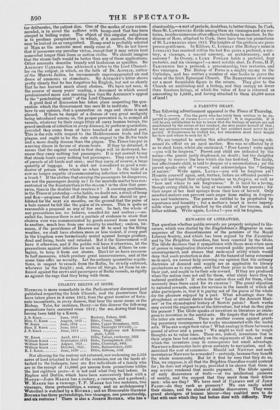CHOLERA.
This disease has made its appearance at Riga, where it has proved beyond example fatal. Out of 707 cases, there are reported 417 deaths. The deaths have commonly occurred within twenty-four hours of the attack. A disease which performs its task so expe- ditiously, does not admit of being paltered with. While the clop. tor deliberates, the patient dies. One of the modes of cure recom- mended, is to cover the sufferer with hemp-seed that has been steeped in boiling water.. The object of this singular cataplasm is to produce perspiration ; in which, if it succeed, the disease may be looked on as vanquished. Hemp-seed is probably selected at Riga as the material most easily come at. We do not know that it possesses any peculiar virtue, except that it may retain heat somewhat longer than linen or cotton cloths. We should imagine that the steam-bath would be better than any of these applications. Other accounts describe brandy and laudanum as specifics. Sir ANTHONY CARLISLE has addressed a letter to the Lord Chancel- lor on the subject, in which, on the faith of Dr. AINSLIE, author of the Materia Indica, he recommends superoxygenated air and doses of ammonia as stimulants. Sir ANTHONY'S letter shows pretty clearly that he has forgotten his English, but not so clearly that he has learned much about cholera. We have not seen, in the course of many years' reading, a document in which sound predominated more and meaning less than Sir ANTHONY'S appeal to the "penetrating mind" of the Lord Chancellor. A good deal of discussion has taken place respecting the qua- rantine which the Government has seen fit to institute. We ad- here to our opinion, that a quarantine on rags and skins is most absurd. If there be danger of a disease of very great malignity being introduced among us, the proper preventive is, to compel all vessels, whatever be their cargo (they all carry human beings, the grand medium of infection in every disease), to perform quarantine, provided they come from or have touched at an infected port. This is the rule with respect to the Mediterranean trade and the plague, and ought to be the rule with respect to the Baltic trade and a more deadly disease than the plague. The Times has put in a saving clause in favour of steam-boats. If they be detained, it seems that the capital vested in that shape will be destroyed, be- cause they carry nothing but passengers. It is not correct to say that steam-boats carry nothing but passengers. They carry a host of parcels of all kinds and sizes ; and they carry, of course, a large quantity of luggage. Is a shirt not considered as good a con- ductor of poison when whole as when torn ? Is the hide of a cow no longer capable of communicating infection when nailed on a trunk ? If the clothes that envelop the passengers be dangerous,
are not the passengers doubly so ? Is the morbific matter less con- centrated in the fountain than in the stfeam ? in the skin that gene- rates, than in the doublet that receives it ? A cunning gentleman,
in the Times of yesterday—who holds, we doubt not, a stock of hemp and flax—proposes that all Baltic hemp and flax should be pro- hibited for the next six months, on the ground that the pulse of a bale cannot be felt like the pulse of its owner. This is quite as reasonable a proposal as any of the rest. In fact, the whole of
our precautions are, we believe, uncalled for and useless ;—un- called for, because there is not a particle of evidence to show that cholera ever was communicated by goods carried from one town
to another, much less- from one country to another; useless, be-
cause, if the providence of Heaven see fit to send us the fitting weather, we shall have cholera more or less violent, if every port in the kingdom were hermetically sealed against foreign produce, dead and living, brute and rational. But it the Government will have it otherwise, and if the public will have it otherwise, let the precautions against infection be such as bid fair, if there be con-
tagion, to keep it from our shores. Don't let us have recourse to half measures, which produce great inconvenience, and at the
same time offer no security. Let the ordinary quarantine regula- tions, in respect to vessels from the Baltic, be strictly enforced, whatever be the freight ; and, above all things, let them be en- forced against the crews and passengers of Baltic vessels, as rigidly as against the rags that they bring with them.



























 Previous page
Previous page